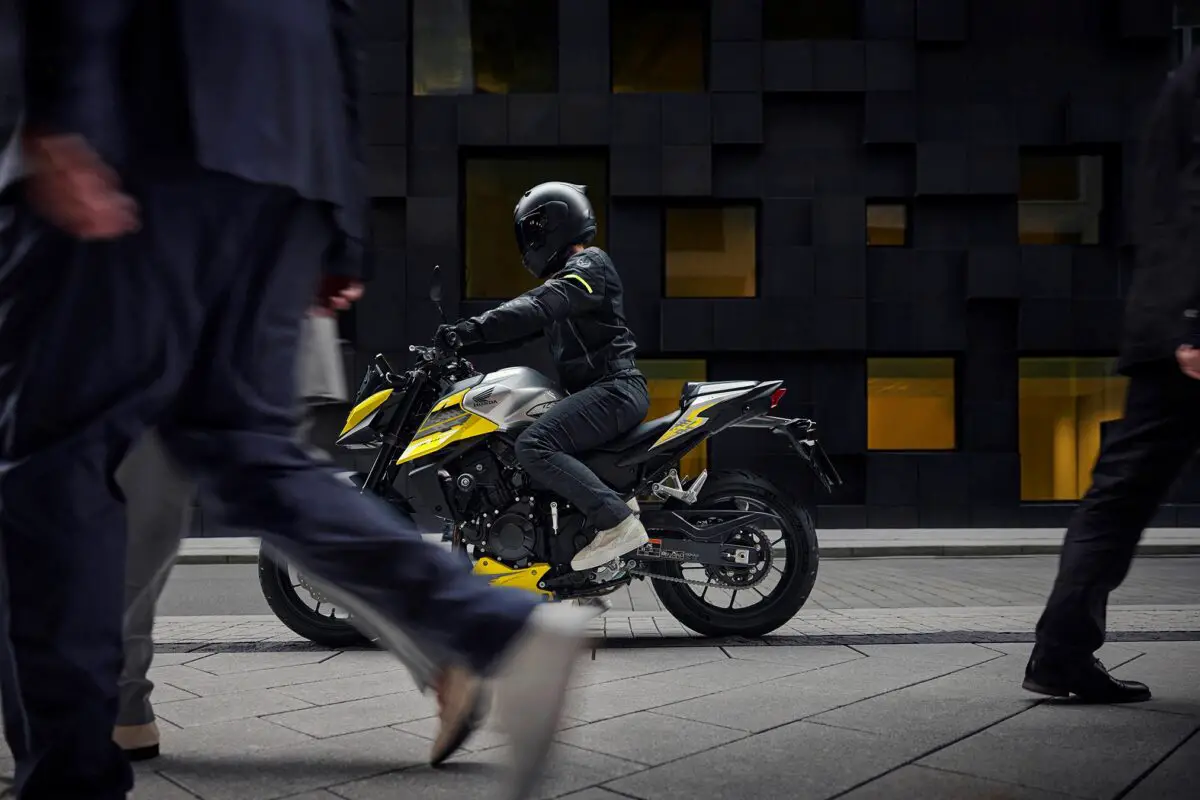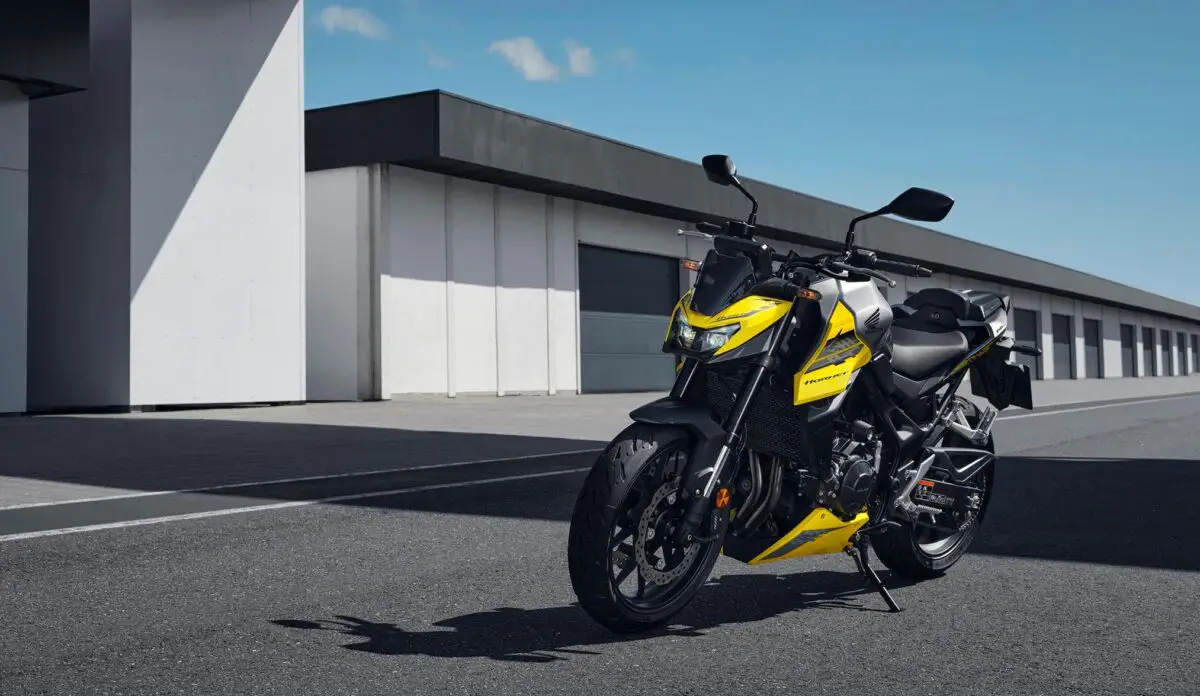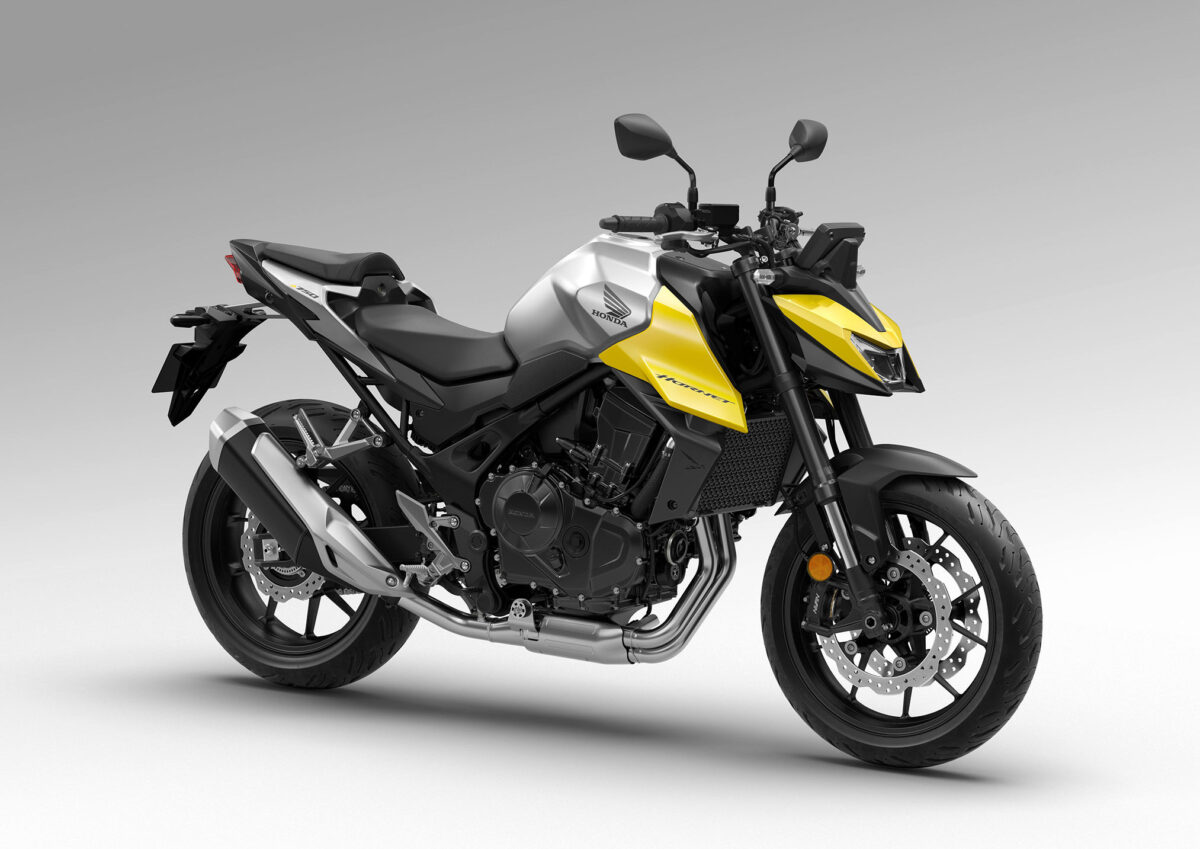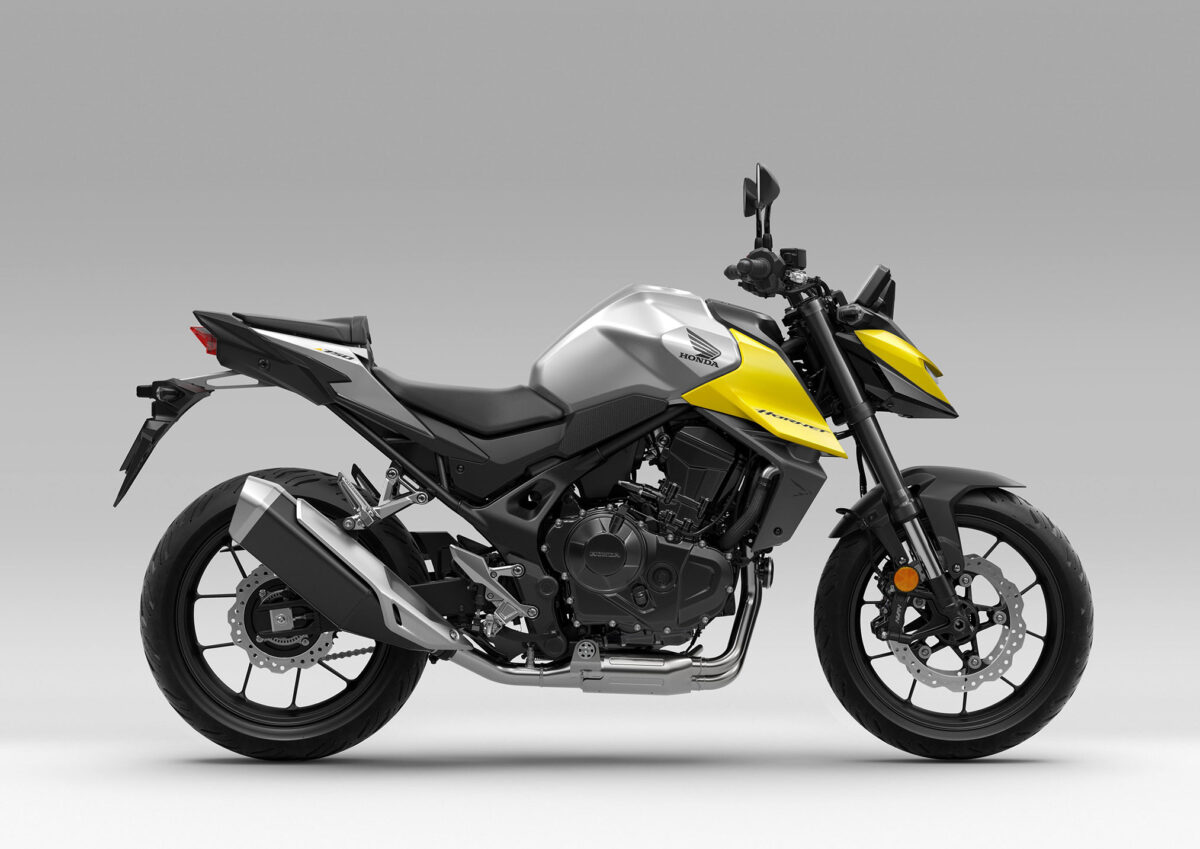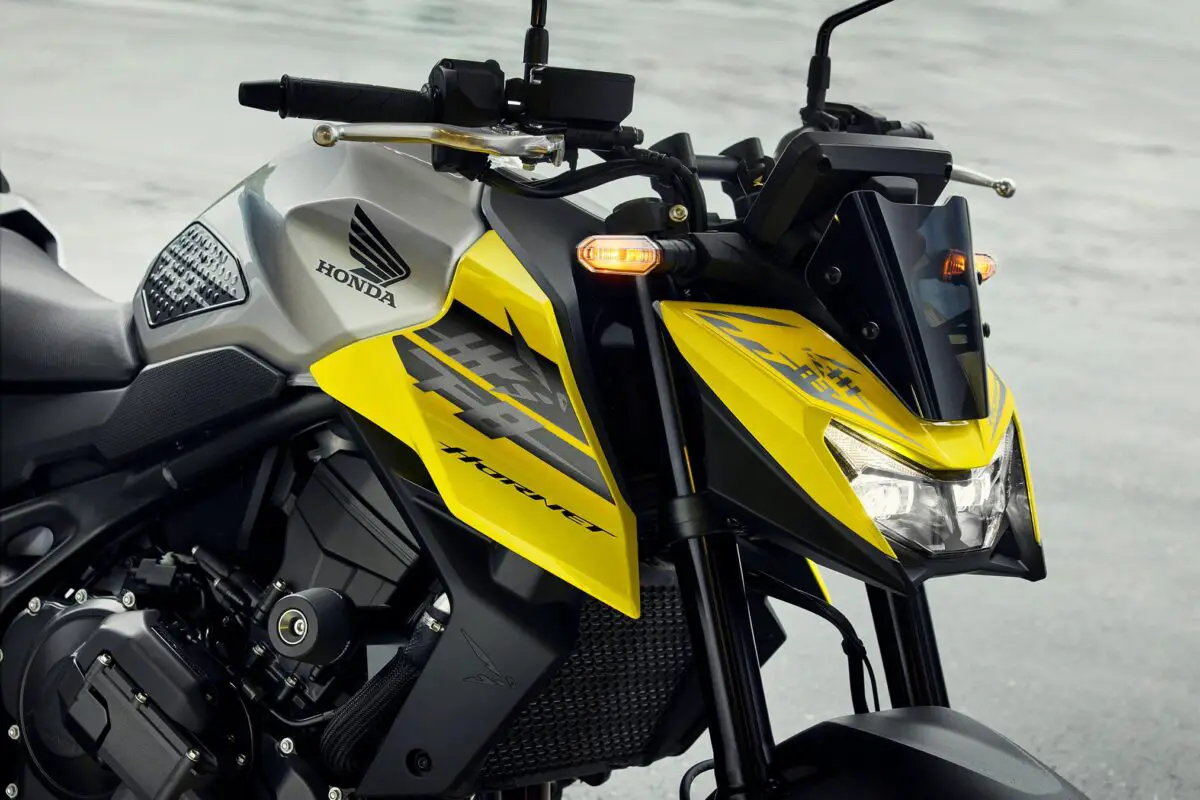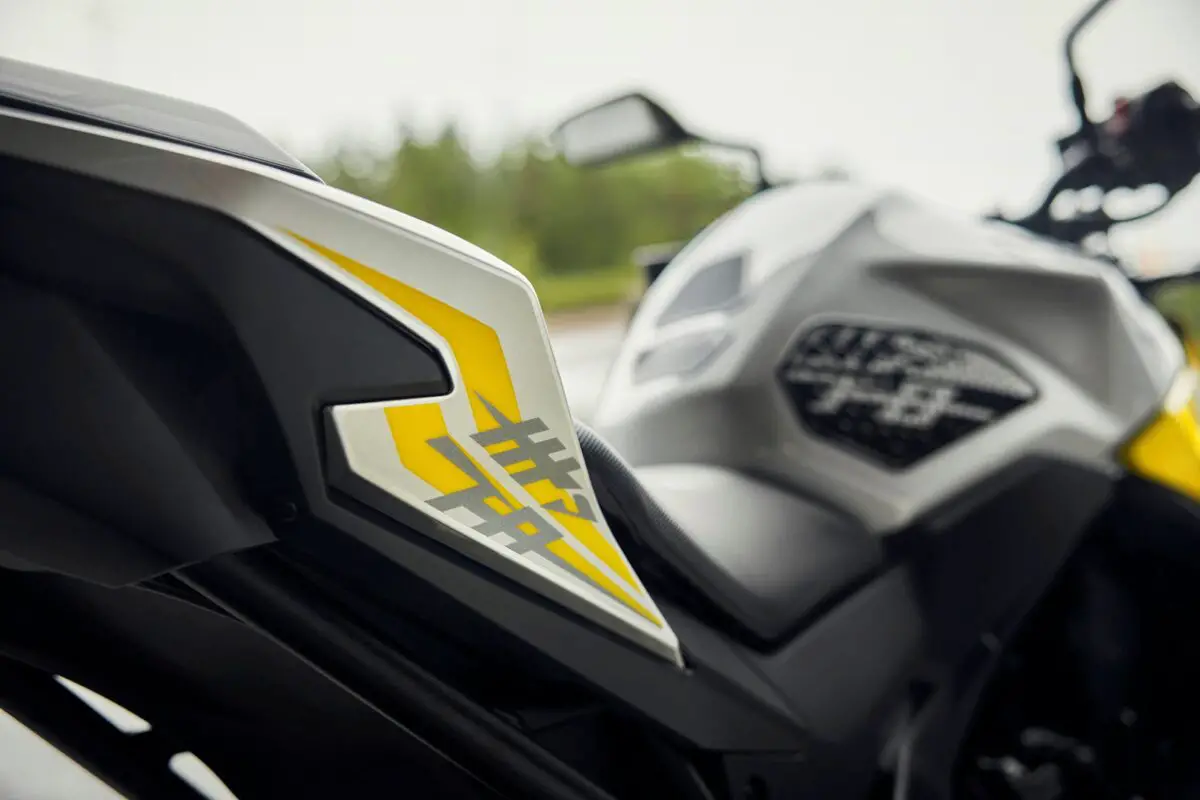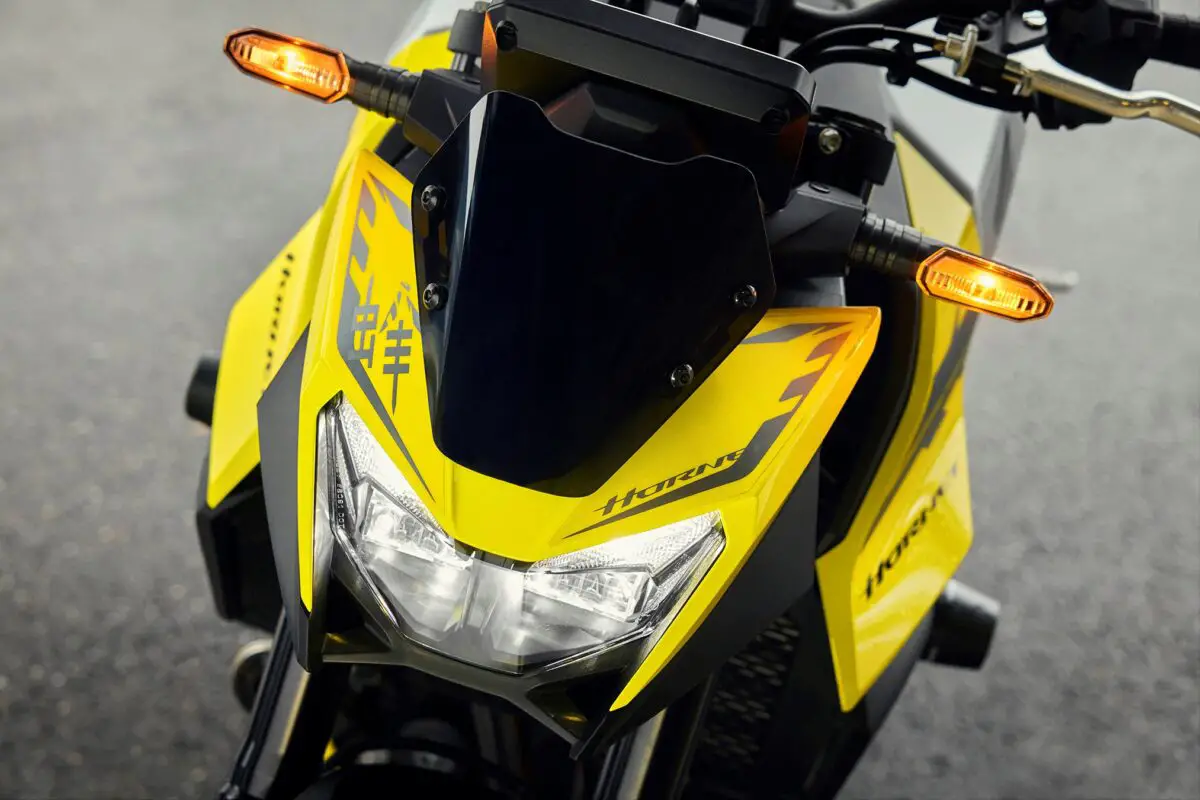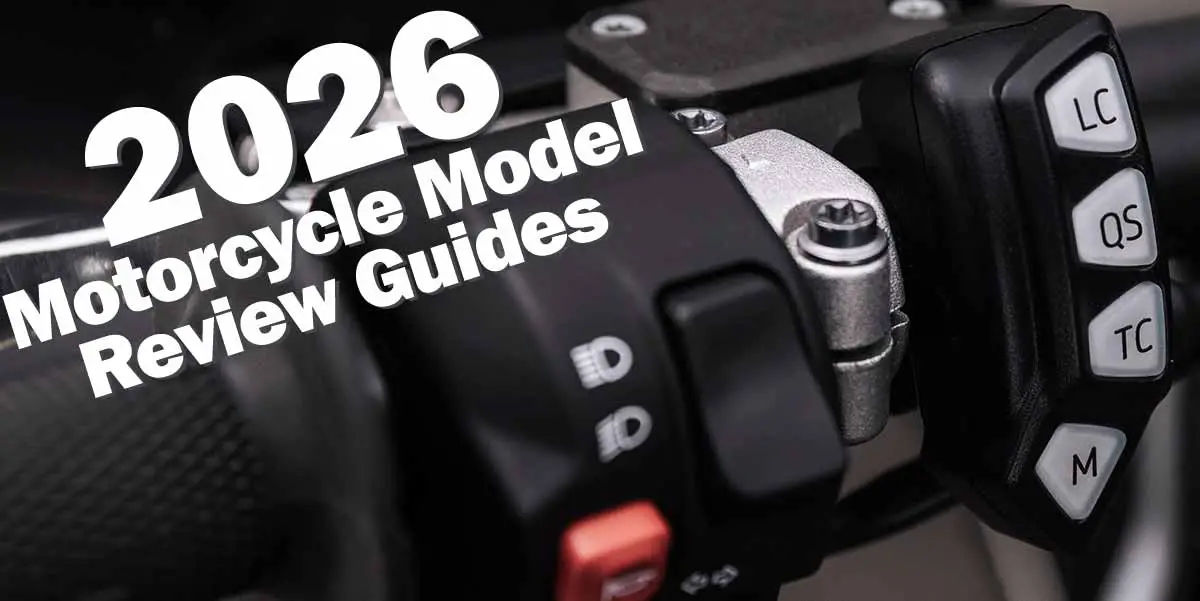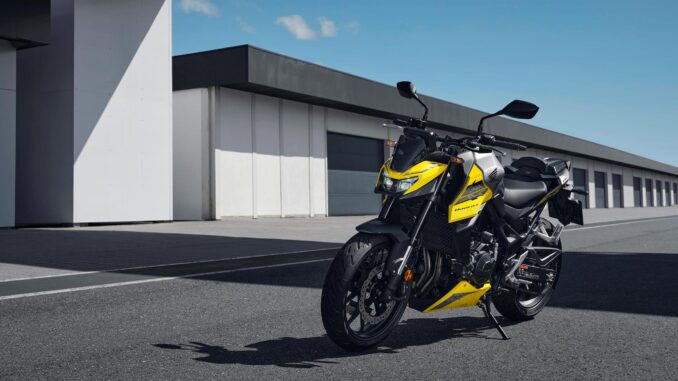
The 2026 Honda CB750 Hornet’s parallel twin-cylinder engine delivers both top end buzz and strong mid-range usability. Lightweight and agile for riotous acceleration.
Review – Key Features – Features & Benefits – Specifications
2026 Honda CB750 Hornet: FAST. AGILE. FUN. AFFORDABLE.
Introducing the 2026 Honda CB750 Hornet…
Carrying zero excess mass, class-leading power-to-weight ratio is delivered by a 67.5kW and 75Nm engine driving a 192kg package. The eight-valve parallel twin-cylinder unit delivers both top end buzz and strong mid-range usability, combining with an ultra-lightweight frame for supremely agile side-to-side performance and instant, riotous acceleration. Throttle By Wire (TBW) unlocks five riding modes allowing tailoring of the three-level Honda Selectable Torque Control (HSTC) with integrated Wheelie Control, and three levels of Engine Braking and Power delivery. Full Showa suspension comprises 41mm Separate Fork Function Big Piston (SFF-BPTM) USD forks and rear shock working through Pro-Link. Dual, radial-mount four-piston calipers bite hard. The five-inch TFT screen features Honda RoadSync smartphone connectivity, the indicators auto-cancel and Emergency Stop Signal (ESS) technology is included. An A2 licence option is also available. Bold new colour combinations round out the 2026 revisions.
The original 1998 CB600F Hornet grew to be a hugely popular bike in Europe, for many reasons. Its compact, naked form was great around town, and it had the engine power and handling ability to carve a section of corners with joyous enthusiasm. Different iterations of the Hornet took it in the direction of sports touring and – in the hands of Hornet Cup racers – an outright race bike, while a 2007 upgrade added extra RR-derived top-end power and much more aggressive style.
Every individual owner had a reason why their Hornet was so good, but two things remained constant throughout its life and development: It was great fun to ride. And the fun came with an affordable price tag.
2023 was the perfect moment for a new Hornet to land – a bike for the time and a whole new generation of riders. It had big tyre tracks to fill and serious competitors to contend with. None of which was lost on Honda’s development engineers. This background drove the creation of something quite special – the CB750 Hornet, a bike which took inspiration and direction from its ancestor but brought the celebrated Hornet brand right back to the cutting edge. And packed it with a direct injection of excitement and pure-thrill adrenaline.
With minimalist streetfighter styling led by the latest generation of creative minds in Honda’s Rome R&D facility, it was developed to attract younger riders looking for a serious move up. In a nutshell, Honda armed the CB750 Hornet with a class-leading power-to-weight ratio. 25YM saw Hornet trademark taut styling amplified through a sharp dual projector headlight, plus revised suspension settings and new five-inch TFT screen.
To keep things simple, three words can be used to sum up the CB750 Hornet: fast, agile, fun.
Model Overview
The Hornet’s engine packs a great deal of Honda’s engineering prowess into a small space. Headline numbers: 755cc parallel twin-cylinder, 67.5kW peak power and 75Nm torque. With wet weight of 192kg it has a class-leading power-to-weight ratio of 0.35kW per kg / 2.84kg per kW.
Compact, competition CRF-derived Unicam eight-valve cylinder heads employ downdraft air intakes and a Vortex Flow Duct to ensure optimal combustion. A 270° crank delivers feel and character; the primary drive doubles as balance shaft while an assist/slipper clutch manages a six-speed gearbox. Electronic rider aids thanks to Throttle By Wire (TBW) include three riding modes (plus USER mode), three-level Honda Selectable Torque Control (HSTC), Wheelie Control with three-level Engine Power and Engine Braking adjustment.
To maximise the engine’s potential, it’s housed in a steel diamond frame, which is extremely light weight thanks to optimisation of wall/pipe thickness and stiffness. For optimal agility and rider feedback, suspension is top quality: Showa 41mm SFF-BPTM USD forks and rear shock operating through Pro-Link. Dual four-piston, radial-mount calipers stop hard while the tyres are sized to provide perfect levels of grip and agility – a 120-section front matched to 160 rear.
The CB750 Hornet’s minimalism is led by a low-set, centrally mounted dual LED projector headlight, tautly wrapped and oozing streetfighter style. The CB750 Hornet owns a style that is distinct from its larger and smaller siblings, carving out an identity all its own. A five-inch TFT colour display supplies vivid information delivery and management of all systems, as well as the connectivity of Honda RoadSync system for both Android and IOS devices. It’s operated, easily, by a four-way toggle switch on the left handlebar.
A range of Genuine Honda Accessories, including updated soft luggage, engine protectors and cosmetic enhancements are ready to go.
2026 Honda CB750 Hornet Totalmotorcycle.com Key Features
The 2026 CB750 Hornet and CB750 Hornet E-Clutch will be available in the following bold colour combinations:
- *NEW* Graphite Black & Mat Ballistic Black Metallic with Red Frame
- *NEW* Wolf Silver Metallic & Iridium Gray Metallic
- *NEW* Goldfinch Yellow & Wolf Silver Metallic
- *NEW* Mat Jeans Blue Metallic & Mat Ballistic Black Metallic
Break free from the hive with the upgraded CB750 Hornet. It delivers class-leading power through a lightweight chassis, built for sharp, sporty performance. Honda E-Clutch with Throttle by Wire adds a next-level advantage – faster, smoother, more intuitive shifting. With head-turning streetfighter style and a dual LED headlight, the CB750 Hornet is ready to take flight. Nothing else comes close.
Class-leading power to weight
The CB750 Hornet’s parallel twin-cylinder engine boosts intake efficiency with a pumped-up vortex, while supersport cylinder technology reduces friction. Producing 67.5kW @ 9,500 RPM and 75Nm @ 7,250 RPM, it surges through the mid-range with a thrilling rush up the rev counter. Twist the throttle for smooth starts, seamless low-speed running, and uncompromised power. With so much performance in such a lightweight chassis, there’s only one thing to do: hold on and enjoy.
2026 Honda CB750 Hornet Totalmotorcycle.com Features and Benefits
Engine
- 755cc parallel twin 8 valve unicam engine
- 67.5kW @ 9,500rpm and 75Nm @ 7,250rpm; A2 licence option
- 270° crankshaft and uneven firing order for maximum engine character
- Patented Vortex Air Flow ducts
- Assist /slipper clutch control
- 23km/l fuel economy with a potential 340km tank range
The parallel twin-cylinder powerplant packs a hugely enjoyable punch to give the Hornet its performance edge and is unchanged for 2026. It’s designed for every rider to exploit to the maximum, with exhilarating peak power output, but also to deliver accessible low to mid-range usability – perfect for the less experienced, and a major boost to the enjoyment of everyday town riding.
755cc, with an 8-valve Unicam cylinder head it pumps out 67.5kW @ 9,500rpm with 75Nm torque @ 7,250rpm. Bore and stroke is set at 87 x 63.5mm with compression ratio of 11.0:1. Compact and lightweight (and a configuration used by the MX competition-ready CRF450R) the Unicam head operates the 35.5mm inlet valves via cam, and the 29mm exhaust by rocker arms. Inlet lift is 9.3mm, exhaust 8.2mm.
For razor-sharp pick-up and throttle response patented Vortex Flow Ducts create a more uniform distribution from the side scoops into the airbox, which then feeds downdraft intakes and 46mm diameter throttle bodies. The 270° crank and uneven firing order create a characterful, twin-cylinder pulse feeling. To make the engine as compact as possible there’s no balancer drive gear; the primary drive gear doubles up duties and spins the balance shaft. The water pump is tucked away inside the lefthand engine cover and there’s no need for a water-cooled oil-cooler. The cylinders also use a Ni-SiC (Nickel-Silicon Carbide) coating, as also used in the CBR1000RR-R Fireblade and CRF450R.
An assist/slipper clutch – with oblique layout disc segments – offers light lever feel, eases up shifts and manages rear wheel hop under hard braking and rapid down changes.
The catalyser and SO2 sensor look forward to legislative compliance. Fuel consumption of 23km/l (WMTC mode) offers a potential range of over 340km from the 15.2L fuel tank. A 35kW, A2 licence option is also available.
Engine Electronics
- Three default rider modes – RAIN, STANDARD and SPORT
- Three levels of Engine Power, Engine Brake and HSTC with integrated Wheelie Control
- USER1 & USER2 customisation option between the three levels
Throttle By Wire engine control offers three default riding modes, adjusting the engine’s delivery and feel to suit conditions and the rider’s intent; they’re easily switched and managed between the left handlebar mode switch and TFT screen.
There are three levels of Engine Power (EP), Engine Brake (EB) and Honda Selectable Torque Control (HSTC) with integrated Wheelie Control available; HSTC can also be switched off. The riding modes offer different combinations of each parameter.
- SPORT uses level three EP and level one EB and HSTC to deliver maximum performance with minimum intervention.
- STANDARD mode is a mid-way setting that uses level two setting for EP, EB and HSTC.
- RAIN mode employs the lowest EP setting, level one, for the least aggressive power delivery with level two EB and three HSTC.
- USER1/ USER2 modes allow the rider to choose between the three settings for each parameter and save the setting for future use.
Styling & Equipment
- Hornet style defines razor-sharp minimalism
- New undercowl available for Hornet and standard on Hornet E-Clutch
- Compact dual projector headlight throws out powerful beams
- Upright riding position for natural control
- Five-inch TFT display with four-way toggle switch and Honda RoadSync smartphone connectivity
- Rear indicators feature Emergency Stop Signal (ESS) and auto cancel technology
The main signature of the Hornet is the fuel tank, which takes inspiration from the shape of a hornet’s wing. Everywhere you look, from the aggressively angled nose-fairing to the razor-sharp, minimal tail, there are hallmarks of tension and aggression, outlining true sporting intent. Up front the headlight unit – comprising dual high/low unified projector lenses – is unique within the Hornet family. With a look of its own within the Hornet family, the LED unit is both compact and powerful. The cockpit cowl amplifies the Hornet’s aggressive streetfighter styling while conveying its engaging, sporty ride.
For 2026, the CB750 Hornet with Honda E-Clutch gains an all-new undercowl that ties together the naked style of the bike, seamlessly integrating with the aggressive styling of the tank and frontal mask without interrupting airflow, and ultimately, the bike’s balance and poise. The svelte part is also available as an optional extra on the standard model.
Usability, for all riders, is also inherent to the design. Seat height is a very manageable 795mm and the riding position upright, with slightly rear set footpegs for natural control and wide handlebars for leverage.
The five-inch full colour TFT screen uses optical bonding to improve visibility in bright sunlight. By sealing the gap between the cover glass and TFT screen with resin, glare is reduced, and backlight transmittance improved. The IOS/Android smartphone connectivity of Honda RoadSync – alongside a simple, easy-to-use, backlit four-way toggle-switch on the left handlebar – allows straightforward, on-screen turn-by-turn navigation as well as the option (via a Bluetooth helmet headset) for the rider to make calls or listen to music. All an owner has to do is download the Honda RoadSync app from either the Play Store or the App Store, connect to the CB750 Hornet, and go.
To simplify and miniaturise the entire electrical system the Hornet uses a Controller Area Network (CAN) alongside a Body Control Unit (BCU). The rear indicators have an Emergency Stop Signal (ESS) function. At a minimum speed of 56km/h, with either brake working if negative acceleration of a minimum of 6.0m/s2 is detected, the hazard lights flash to warn other road users a hard stop is in process. At the same speed the threshold is reduced if ABS is activated, to a negative acceleration of a minimum 2.5m/s2.
Both front and rear indicators also auto-cancel; rather than using a simple timer, the system compares front and rear wheel speed difference and calculates when to cancel the indication relative to the situation.
Chassis
- Lightweight 16.6kg steel diamond frame with integrated subframe
- Showa 41mm SFF-BP USD forks and Pro-link 7-stage adjustable rear shock
- Four-piston front calipers/296mm wave discs; single piston caliper/ 240mm rear disc
The Hornet’s steel diamond frame is lightweight, at just 16.6kg (for comparison, the CB650R’s is 18.5kg). A major technological process of stiffener, main/down tube thinning, and pivot shape optimisation has produced a hugely strong platform, with rigidity balance to deliver feel and geometry set for agility – just what the engine needs.
Rake and trail are set at 25° and 99mm, with wheelbase of 1,420mm and kerb weight of 192kg (Honda E-Clutch – 196kg).
With a view to heighten sports handling performance (especially braking from higher speeds) Showa 41mm Separate Function Fork Big Piston (SFF-BPTM) USD forks are clamped by Hornet-specific top and bottom yokes. With 130mm travel and by dividing the functions – Big Piston pressure separation damper in one leg, spring mechanism in the other – maximising both reaction over changes in road surface and the overall ride quality.
The rear shock absorber operates through the steel swingarm via Pro-Link and offers 150mm travel. Its design ensures excellent response and temperature management; it features 7-stage preload adjustment to match the forks. Damping settings are optimised front and rear to maximise the front wheel’s contact patch for a more dynamic, sports riding experience.
Dual front 296mm discs and Nissin radial-mount, four-piston calipers deliver impressive, fingertip stopping power, with excellent progressive feel through the lever. To further elevate handling and ride quality lightweight wheels use Y-shaped spokes. The 3.5inch width front wheel wears a 120/70-ZR17 tyre, the rear 4.5inch a 160/60-ZR17 tyre.
Accessories
A full range of Genuine Honda Accessories are available for the Hornet, ready for personalisation to an owner’s preference and use.
New for 2026 is a new colour-matching Under Cowl for non E-Clutch variant, and a new set of decorative stickers with Kanji inspired graphics.
To make it easy for an owner there are four packs that group the accessories neatly together:
Style Pack
Designed to enhance both the aesthetics and functionality of your Hornet. The Radiator Grill and Wheel Stripes – available in Black, Grey, and Yellow – increase the look and the protection, the Aluminium Handlebar Holder, Rider Steps and Grip Ends add style. A Rider Seat finished with a 2-tone grey and black colour with contrasting stitching finishes up the overall look.
Sports Pack
A real performance upgrade: The adjustable Quick Shifter (for non E-Clutch variants only) allows instant, full-throttle upshifts and auto-blips through clutch less downshifts. And for added sports style the Seat Cowl – available in Red, Grey or Yellow – is matched to a Meter Visor. The Tank Pad and Skid Pad provide extra protection when riding.
Comfort Pack
The Comfort Pack is a versatile collection designed to enhance rider comfort and convenience. This pack provides storage for essentials with a Rear Seat Bag and 3L Tank Bag, ensuring convenience during rides. The Heated Grips offer enhanced comfort in cold weather.
Design Pack *NEW*
This pack adds a unique touch to the CB750 Hornet while enhancing its aesthetics. The pack includes the Under Cowl (for non E-Clutch variant) and dedicated stripes, Shroud Stripes, Rear Cowl Stripes, Head Light Cowl Stripes and the Side Grip Tank Pads. All the accessories are colour-matching the bike colour.
Additional accessories include Side Bags, Rubber Side Tank Pads and a SC-Project Slip-on muffler (Customized EU accessory). All accessories are available separately.
2026 Honda CB750 Hornet – Totalmotorcycle.com USA Specifications/Technical Details
US MSRP Price: $ TBA USD
Canada MSRP Price: $ TBA CDN (includes Freight, PDI and Fees)
Europe/UK MSRP Price: £ See Dealer for Pricing in GBP (On The Road inc 20% Vat)
TBA
2026 Honda CB750 Hornet – Totalmotorcycle.com Canada Specifications/Technical Details
TBA
2026 Honda CB750 Hornet – Totalmotorcycle.com Europe Specifications/Technical Details
| CB750 Hornet | CB750 Hornet (A2 Version) | CB750 Hornet E-Clutch | CB750 Hornet (A2 Version) E-Clutch | |
| ENGINE | ||||
| Engine Type | Liquid-cooled SOHC 4-stroke 8-valve Parallel Twin with 270° crank | |||
| Engine Displacement | 755 cc | |||
| Bore x Stroke (mm) | 87 mm x 63.5 mm | |||
| Compression Ratio | 11.0:1 | |||
| Max. Power Output | 67.5 kW at 9,500 rpm | 34.5 kW at 5,250 rpm | 67.5 kW at 9,500 rpm | 34.5 kW at 5,250 rpm |
| Max. Torque | 75 Nm at 7.250 rpm | 66 Nm at 4,750 rpm | 75 Nm at 7.250 rpm | 66 Nm at 4,750 rpm |
| Stationary Noise Level (dB) | max. 77 dB | |||
| Max Speed | 205 km/h | 170 km/h | 205 km/h | 170 km/h |
| Oil Capacity | 3.8 L | |||
| Starter | E-Starter | |||
| FUEL SYSTEM | ||||
| Carburation | PGM-FI Fuel Injection | |||
| Fuel Tank Capacity | 15.2 L | |||
| CO2 Emissions WMTC | 99 g/km | 95 g/km | 99 g/km | 95 g/km |
| Fuel Consumption | 4.3 L/100km | 4.1 L/100km | 4.3 L/100km | 4.1 L/100km |
| ELECTRICAL SYSTEM | ||||
| Battery Type | AGM | |||
| Battery Capacity | 12 V 9.1 Ah (20h) | |||
| DRIVETRAIN | ||||
| Clutch Type | Wet multiple, Assisted slipper clutch | |||
| Transmission Type | 6-speed Manual Transmission | |||
| Final Drive | Chain | |||
| FRAME | ||||
| Frame Type | Diamond Steel Frame | |||
| CHASSIS | ||||
| Dimensions (L´W´H) | 2,090 mm x 780 mm x 1,085 mm | |||
| Wheelbase | 1,420 mm | |||
| Caster Angle | 25° | |||
| Trail | 99 mm | |||
| Seat Height | 795 mm | |||
| Ground Clearance | 140 mm | |||
| Kerb Weight | 192 kg | 196 kg | ||
| Turning radius | 2.7m | |||
| SUSPENSION | ||||
| Suspension Front | Showa 41 mm SFF-BP USD, 130 mm travel | |||
| Suspension Rear | Monoshock damper, Prolink swingarm, 150 mm travel | |||
| WHEELS | ||||
| Wheels Front | 17M/C x MT3.50 5Y-Spoke Cast Aluminium | |||
| Wheels Rear | 17M/C x MT4.50 5Y-Spoke Cast Aluminium | |||
| Tyres Front | 120/70ZR17M/C (58W) | |||
| Tyres Rear | 160/60ZR17M/C (69W) | |||
| BRAKES | ||||
| ABS Type | 2-channel ABS | |||
| Brakes Front | Radial mounted four-piston Nissin brake caliper, 296 mm floating double disc | |||
| Brakes Rear | Single piston caliper, 240 mm single disc | |||
| INSTRUMENTS & ELECTRICS | ||||
| Instruments | 5-inch TFT Panel Multi information display | |||
| Headlight | LED (2-sqare projecters) | |||
| Taillight | LED | |||
| Connectivity | RoadSync | |||
| USB | Type – C | |||
| Auto Winker Cancel | Yes | |||
| Security System | HISS | |||
| Riding mode | Sport, Standard, Rain and USER1/ USER2 Modes | |||
| HSTC | 3 Level + OFF | |||
| Additional Features | ESS | |||
All specifications are provisional and subject to change without notice.
# Please note that the figures provided are results obtained by Honda under standardised testing conditions prescribed by WMTC. Tests are conducted on a rolling road using a standard version of the vehicle with only one rider and no additional optional equipment. Actual fuel consumption may vary depending on how you ride, how you maintain your vehicle, weather, road conditions, tire pressure, installation of accessories, cargo, rider and passenger weight, and other factors.
Manufacturer Specifications and appearance are subject to change without prior notice on Total Motorcycle (TMW).


